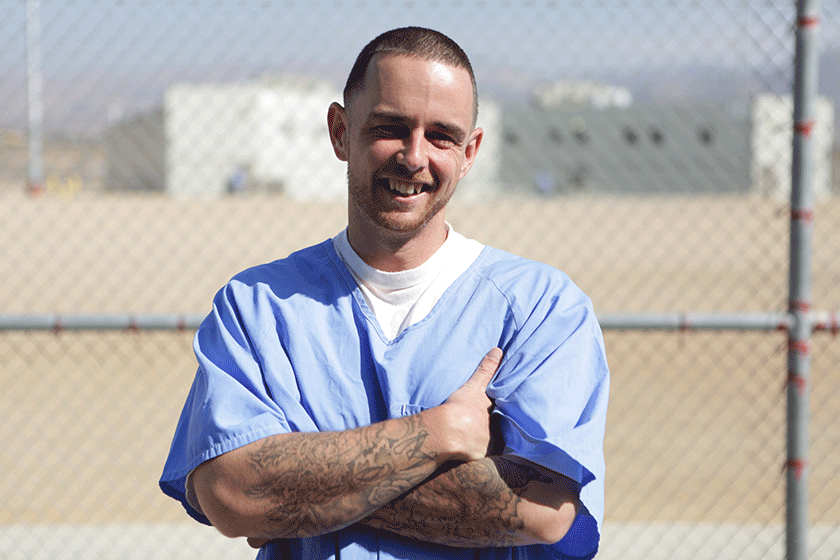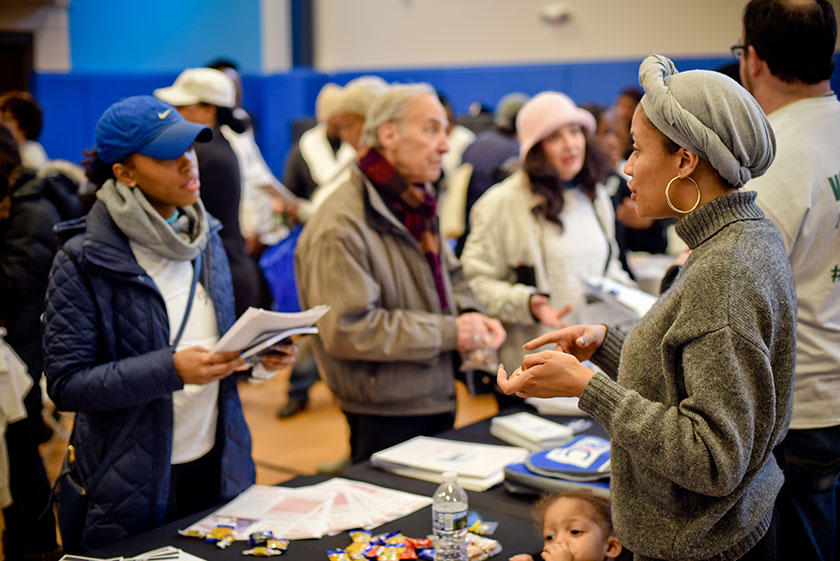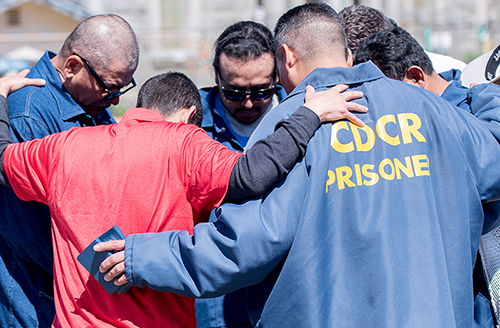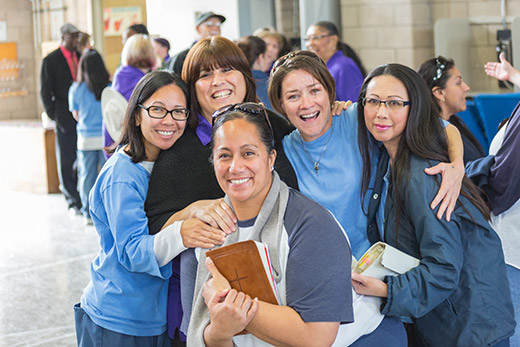It seemed like an impossible dream: Could a criminal justice reform bill pass a divided Congress and a "tough-on-crime" administration? After all, it had been years—decades—since any significant reform had occurred. It would take a miracle for the FIRST STEP Act to succeed.
That miracle arrived just in time for Christmas. On December 21, 2018, the FIRST STEP Act was signed into law by President Donald Trump.
What makes the FIRST STEP Act so unique? Why did it pass? What will it do for America's incarcerated? Where does the reform's actual impact stand more than a year after its passage?
WHAT IS THE FIRST STEP ACT?
The United States' federal prison system is in desperate need of reform. A lack of good rehabilitative programming, compounded by overcrowded prisons and disproportionate sentencing, has created a revolving door in prisons that affects local communities and our nation.
The FIRST STEP Act is the first step in transforming federal prisons into safe and effective facilities that will reduce recidivism and strengthen our communities and economy. The legislation expands rehabilitative programming and earned-time credit opportunities. It also reduces and clarifies mandatory minimums and better provides for the needs of federal prisoners.
The FIRST STEP Act was sponsored by Rep. Doug Collins, R-Ga.; Rep. Hakeem Jeffries, D-N.Y.; Sen. Chuck Grassley, R-Iowa; and Sen. Dick Durbin, D-Ill.
TIMELINE
MAY 2018
U.S. House of Representatives Passes FIRST STEP Act Bill with a Vote of 360-59
NOVEMBER 2018
White House, U.S. Senate Leadership Reach Agreement on Sentencing Reforms Added to FIRST STEP Act
DECEMBER 2018
December 18—Senate Passes FIRST STEP Act with a Vote of 87-12
December 20—House Passes FIRST STEP Act with a Vote of 358-36
December 21—President Donald Trump Signs the FIRST STEP Act into Law
JANUARY 2019
Matthew Charles and the First Prisoners Are Released Under the New Law
JULY 2019
More than 3,000 federal prisoners qualify for earlier release thanks to the FIRST STEP ACT's clarification of the good time credit policy used in federal prisons.
The Department of Justice releases an initial draft of the risk and needs assessment (PATTERN). This tool will be used to assess each federal prisoner and assign them to appropriate programming and activities.
DECEMBER 2019
Congress authorizes full funding of $75 million for First Step Act implementation in Fiscal Year 2020 as part of a larger spending package.
JANUARY 2020
The Department of Justice announces updates to PATTERN and that all federal prisoners received an initial evaluation under the tool. The Department also publishes a preliminary list of all federal prison programming and productive activities considered evidence-based and rehabilitative.
'Senators thought this was a sleepy issue
that people were unaware of in their home states.
They were very surprised.'
Craig DeRoche,
Prison Fellowship's Senior Vice President of advocacy and public policy
FREQUENTLY ASKED QUESTIONS ABOUT THE FIRST STEP ACT
The Department of Justice will develop a Post-Sentencing Risk and Needs Assessment System that will be implemented in all federal facilities. Prisoners’ individual risks and needs will be assessed annually.
The Bureau of Prisons (BOP) will be charged to increase and improve prison programming, including through partnerships with outside nonprofit and faith-based organizations. Programs deemed “evidence-based” or “productive activities” may qualify for earned-time credits.
Incentives are provided for successful program completion and responsible conduct during incarceration, such as increased phone and visitation privileges, increased commissary spending levels, and opportunities to serve sentences in facilities closer to home. Some federal prisoners, based on their risk level and conviction, may use these credits to complete more of their sentence outside of prison in home confinement or a residential reentry center.
Programming gaps in the Bureau of Prisons are even more apparent thanks to research initiated by the First Step Act. A Department of Justice study of federal prisons found that 49% of the sample population did not complete any programming; 82% received no technical or vocational courses; and 57% completed no drug treatment during incarceration despite an indicated need.
Congress provided more certainty for the BOP’s budget and strategic planning by authorizing $75 million for the implementation of the First Step Act for Fiscal Year 2020. It is Prison Fellowship’s hope for the Bureau will partner with more non-profit and community-based organizations, including Prison Fellowship, to provide a greater number of rehabilitative programming and productive activities.
The Department of Justice has made progress with its newly developed risk and needs assessment (PATTERN). Key stakeholders have nevertheless raised several important questions about the tool concerning extent of racial disparities, if the system could exclude individuals who pose limited threats to public safety from spending more of their sentence outside of prison, and whether the assessment sufficiently weighs a prisoner’s productive behavior during incarceration. We urge the continued refinement and improvement of PATTERN.
Mandatory minimums for prior serious drug felonies will be reduced. Prisoners serving life sentences under the three-strikes penalty will have their sentences reduced to 25 years. Mandatory minimums of 20 years will be reduced to 15 years. Serious violent felonies will be added to the three-strike enhancement penalty.
Under the new law, judges can depart from mandatory minimums when sentencing defendants with up to four criminal history points, excluding misdemeanors. Defendants with three-point offenses or two-point violent offenses will be restricted.
Mandatory minimums under 18 USC § 924(c) (use of a firearm during the commission of multiple crimes) will be limited to prisoners with previous convictions who have served their sentences for such offenses.
Current federal prisoners sentenced for crack cocaine offenses prior to the Fair Sentencing Act of 2010 may petition for relief consistent with the Fair Sentencing Act.
More than 2,450 incarcerated individuals in the BOP, including Matthew Charles, received changes to their sentence thanks the First Step Act’s more proportional approach to certain drug offenses.
In order for FSA’s reforms to fully impact sentencing practices, the U.S. Sentencing Commission must incorporate these changes into its advisory guidelines used by federal judges. Five present vacancies on the Commission make it impossible for it to amend their guidelines in light of FSA. Prison Fellowship encourages the White House to nominate—and Congress to approve—Commissioners committed to the spirit and letter of the legislation.
The law codifies Bureau of Prisons policy banning the practice of shackling pregnant and laboring incarcerated mothers unless the woman poses an immediate and serious risk to herself, her child, or others.
The BOP is required to provide feminine hygiene products to incarcerated women at no cost.



'When people receive sentences that don't fit their crime, America loses. Disproportional sentences are an affront to the dignity of people made in the image of God and erode faith in the notion of 'equal justice under the law.''
Craig DeRoche,
Prison Fellowship's Senior Vice President of advocacy and public policy
IN THE NEWS
THE FIRST STEP ACT IN THE NEWS
- The First Step Act in Action (World Magazine, 7/17/2019)
- Man Freed by Criminal Justice Reform Bill says Trump, Both Parties Can 'Work for the Good' (USA Today, 02/04/19)
- Religious Conservatives Celebrate Criminal Justice News (Politico, 12/11/18)
- Trump's Evangelical Advisers Could Help Him Secure a Win on Sentencing Reform (The Atlantic, 12/12/18)
- The Improbable Success of a Criminal Justice-Reform Bill Under Trump (The New Yorker, 12/17/18)
- Senate Passes Criminal Justice Reform (World Magazine, 12/19/18)
OPINION EDITORIALS ON THE FIRST STEP ACT
- Craig DeRoche: After the First Step Act, we all have a role to play to build a society of second chances (Fox News, 07/28/2019)
- Point of View: Federal Prisoners Need a Step in the Right Direction (The Oklahoman, 12/12/18)
- FIRST STEP Act Recognizes That Prisoners, Too, Are Made in God's Image (Religious News Service, 12/14/18)
PRISON FELLOWSHIP PRESS RELEASES
- Reps. Doug Collins and Hakeem Jeffries Presented with Colson Advocate Award (12/2019)
- President Trump Signs FIRST STEP Act Legislation—"Makes America Safer" (12/21/18)
- Prison Fellowship Praises Senate for Paving Way for FIRST STEP Act House Passage (12/18/18)
- Prison Fellowship Releases State Legislator FIRST STEP Act Support Letter (12/17/18)
- Prison Fellowship Responds to Agreement on FIRST STEP Act Language (11/15/18)
- Prison Fellowship Applauds Passage of FIRST STEP Act in U.S. House (5/22/18)
PRISON FELLOWSHIP BLOG POSTS
- The Faith of Matthew Charles (8/2019)
- Implementing the First Step Act: Where Are We Now? (12/2019)
- How the Last Bipartisan Issue in Congress Continues to Draw Support from Diverse Faith Communities (Berkley Center, 1/16/19)
- 'Our Christmas Miracle'—President Trump Signs the FIRST STEP Act into Law (12/22/18)
- Risk Assessment Q&A with Zachary Hamilton, Ph.D. (9/3/18)
- Advocates Cry Out for Justice Reform at D.C. Rally (7/17/18)
'The great hope is, of course, that incarcerated people will use their sentences to pursue significant changes in their lives, make amends for their wrongdoing, and earn back the public’s trust. It makes sense, then, for prisoners to have access to as many transformative resources as possible—spiritual, educational, and vocational.'
Heather Rice-Minus, Prison Fellowship's Vice President of government affairs



HOW CAN I HELP ENSURE THE FULL PROMISE OF THE FIRST STEP ACT?
Use Prison Fellowship's simple grassroot tool to contact your congressional representatives and call for the full implementation of this historic reform!
DID YOU ENJOY THIS ARTICLE?
Make sure you don't miss out on any of our helpful articles and incredible transformation stories! Sign up to receive our weekly newsletter, and you'll get great content delivered directly to your inbox.
Your privacy is safe with us. We will never sell, trade, or share your personal information.
SUPPORT THE WORK OF PRISON FELLOWSHIP